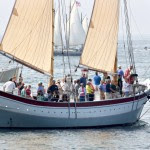Harold was interviewed by the Boston Globe recently and the story appeared on the front page of the Dec. 28 issue today. The story was written by veteran Globe reporter David Filipov and is called Masters keep Antique Presses Printing, Indian Drums Beating and the gist of the story is about Massachusetts artisans who have received special grants to pursue and preserve their craft. Harold was a grant recipient in 2006. The quote Harold gave the Globe is worth reading and the overall story is great.
The link is posted here - http://www.boston.com/news/local/massachusetts/articles/2009/12/28/masters_keep_knowledge_of_crafts_alive_with_support_from_state/
http://www.boston.com/news/local/massachusetts/articles/2009/12/28/masters_keep_knowledge_of_crafts_alive_with_support_from_state/
Monday, December 28, 2009
Wednesday, December 23, 2009
Thursday, December 17, 2009
Putting the canvas covers on the sloops
Getting boats covered here at Burnham Boatbuilding is an important part of the winterization process. Harold is pictured here covering the Dream and the Maria with canvas cloth. All the boats in the yard have canvas covers which is more attractive and sounds a lot different than plastic or shrink wrap when old man winter hits. On the bottom left, is Harold's Dad, Charles standing on the dock a few weeks ago and on the right is Harold getting the cover on.
Wednesday, December 2, 2009
Splitting a log for a wooden schooner
 These photos are somewhat out of sequence but yesterday Harold tackled a massive white oak log that he wanted to cut and use for frame futtocks. The oak had a natural crux that is great for frame futtocks as it is so much stronger as the grain will follow the frame. It is not easy to get a log with that much curve in it from a regular sawyer. So, Harold was particularly pleased with its curved lines. It took a total of about 45 minutes to get the log on the sawmill for cutting. Harold first used his chainsaw but then use a sledgehammer and wedges for quite a while. All the while, the wood was making its own special crackling and squeaking sounds. Finally, it split and he had it on the sawmill. Thank you Eric, for some extra muscle!
These photos are somewhat out of sequence but yesterday Harold tackled a massive white oak log that he wanted to cut and use for frame futtocks. The oak had a natural crux that is great for frame futtocks as it is so much stronger as the grain will follow the frame. It is not easy to get a log with that much curve in it from a regular sawyer. So, Harold was particularly pleased with its curved lines. It took a total of about 45 minutes to get the log on the sawmill for cutting. Harold first used his chainsaw but then use a sledgehammer and wedges for quite a while. All the while, the wood was making its own special crackling and squeaking sounds. Finally, it split and he had it on the sawmill. Thank you Eric, for some extra muscle!
Friday, November 27, 2009
Thanksgiving in the barn
We did things a little differently this Thanksgiving and had the dinner (for 35) in the barn. In the pictures you see Alden, Perry and Harold chopping potatoes which Harold boiled outside on our steam cooker. The stove belonged to Grandma. After 49 years, it was finally replaced this week but with the help of a friend we hooked it up to a propane tank and cooked its last meal outside under the bandsaw for the whole family.
Also, the barn looked great and when all the food arrived it certainly was full of beautiful, delicious dishes and a fantastic turkey. The preparation was fun and everyone in our families pitched in and helped make it all happen. It was a great day and we hope to do it again sometime. Happy Thanksgiving!
Thursday, November 19, 2009
No Man's Land boat gets a new set of sails
Geoff Gordon was here this a.m. putting the masts away on his No Man's Land boat. This boat was finished by Dave Brown and volunteers at the Essex Shipbuilding Museum (http://www.essexshipbuildingmuseum.org/) in 2004 and Geoff and his wife, Therese Sellers won it in a raffle The two have been sailing around Cape Ann ever since. They brought their boat here for a new, larger, set of sails. We built the first set in 2004. We are having a good time working with them planning their new rig.
Monday, November 16, 2009
November morning at Burnham Boatbuilding
November morning at Burnham Boatbuilding (above) and Daisy the dog trying to keep up with Harold
The weather couldn't be better for a boatbuilder - especially as Harold is caulking the yawl "Sawdust" inside the barn..but the barn door is open and it is still warm enough to keep it that way. The sound of a caulking mallet in an Essex shipyard is probably a familiar one to generations before us but less so now. It is one that a trained ear can distinguish very clearly from the sound of hammers and nails. It is a sound all of its own.
Subscribe to:
Posts (Atom)


















